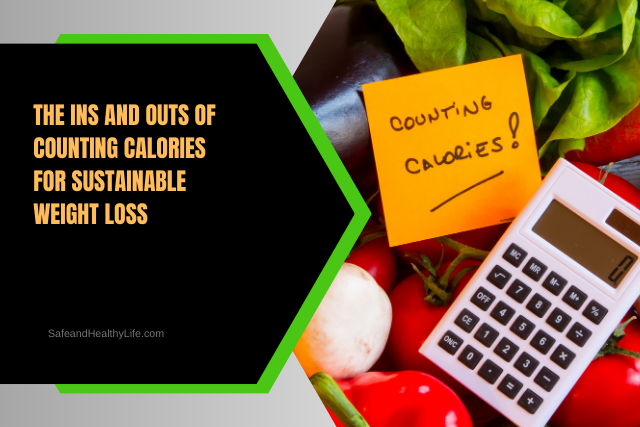
You may like also:
- 10 Ways to Burn Calories and Lose Weight Quickly
- 6 Tips for Sticking to Your Weight Loss Goals
- Advanced Guide To Healthy Weight Loss
Counting calories can be an effective strategy for losing weight, but is it sustainable?
This in-depth guide examines the pros and cons of tracking calories for long-term weight management.
What Does Calorie Counting Involve?
Calorie counting, also known as calorie restriction, means calculating your daily calorie intake target and tracking the calories from all foods and drinks consumed to ensure you stay within your limit.
First, you need to determine the number of calories your body requires to maintain its current weight, known as your maintenance calories. This can be estimated using equations like the Mifflin-St. Jeor formula calculates your BMR (Basal Metabolic Rate) based on age, sex, height, and weight. Your total daily energy expenditure is your BMR multiplied by an activity factor between 1.2 to 1.9, depending on your exercise habits.
You must create a calorie deficit to lose weight by consuming fewer calories than your maintenance level. A deficit of 500-1000 calories daily equals 1-2 lbs of weight loss per week. Apps like MyFitnessPal make tracking calories easy by containing extensive food databases, but you can also use a food journal or nutrition labels.
The Logic Behind Calorie Counting
At its core, calorie counting operates on the principle of energy balance for weight management. Your energy intake must equal your energy expenditure to maintain weight. You must tip this scale by cutting calories to lose weight, so your body must draw energy from fat stores.
Reducing calorie consumption by 500-1000 daily leads to a weekly 3,500-7,000 calorie deficit. Since one pound of fat contains approximately 3,500 calories, this weekly deficit translates to 1-2 pounds of fat loss.
For this reason, calorie counting can produce fairly predictable weight loss results in the short term. However, the method has limitations for long-term, sustainable weight management.
Potential Benefits of Calorie Counting

1. Increased Awareness of Eating Habits
Rigorously tracking calories can illuminate issues like mindless snacking or oversized portions that may hinder weight loss. Self-monitoring makes you more conscious of what, when, where, and why you eat.
2. Accountability and Quantified Progress
The numbers prove how well you adhere to your plan. Tracking keeps you disciplined and allows you to make calorie adjustments based on the data.
3. Nutrient-Dense Food Selection
Dieters tend to increase their intake of satiating yet low-calorie foods like fruits, vegetables, and lean protein to keep calories low while feeling full. This improves diet quality.
4. Initial Weight Loss
For most, diligently monitoring calorie intake does lead to expected weight loss in the short term, especially combined with exercise. This provides positive reinforcement.
Drawbacks and Dangers of Long-Term Calorie Counting

1. Tedious and Time-Consuming Tracking
Calories require reading labels, measuring portions, logging meals, and frequently recalculating targets. This intense focus on numbers is only sometimes sustainable.
2. Risk of Disordered Eating Patterns
Calorie counting can promote an unhealthy obsession surrounding food and weight. For some, it leads to restrictive behaviors or harmful cycles of binging and restricting.
3. Quality Over Quantity
A calorie is not just a calorie for health. For example, 100 calories from an avocado affect your body differently than 100 calories from a doughnut. However strict counting focuses solely on quantity.
4. Metabolic Adaptations
As you lose weight, your body adapts by burning fewer calories. Very low-calorie diets can cause adaptive thermogenesis, slowing your metabolic rate. This makes continuous loss harder and easier to regain the lost weight.
5. Lack of Flexibility Rigid
Calorie targets do not accommodate variables like stress, poor sleep, menstrual cycles, etc., which can influence weight fluctuations. This can frustrate dieters.
6. Not Sustainable Long-Term
For most people, precisely tracking calories day after day for life is not feasible or enjoyable. This makes maintaining weight loss difficult.
7. Other Strategies for Weight Management
Thankfully, calorie counting is not the only option for losing and keeping weight off. Various dietary approaches can facilitate weight loss in a healthier, more sustainable way.
8. Intuitive and Mindful Eating
This involves listening to internal hunger and fullness cues to guide when and how much you eat without tracking calories. Staying present while eating also increases enjoyment and satisfaction.
8. Macro Counting
Rather than micro-managing calories, some focus on the optimal balance of protein, carbs, and fat based on lifestyle goals like building muscle or endurance.
9. Meal Planning
Planning balanced meals and snacks leaves less room for impulsive choices. Batch cooking saves time while ensuring portion control.
10. Intermittent Fasting
Fasting cycles can create calorie deficits while giving digestive systems a break and allowing insulin to normalize. This approach suits some people’s preferences better than strict tracking.
The Verdict: Should You Count Calories?
Calorie counting can provide short-term weight loss, but its efficacy depends on the individual. Factors like your relationship with food, personality, lifestyle, and preferences determine if tracking calories is a pro or con for you.
Best Candidates for Calorie Counting
- Very overweight and need a structured approach
- “All or nothing” mentality
- History of poor portion control
- Motivated by numbers and data
- Analytical, detail-oriented personality
When Calorie Counting May Backfire
- Prone to disordered eating
- Find tracking stressful or obsessive
- Prefer flexible, intuitive eating approach
- Need variety and freedom in diet
- History of restrictive dieting and rebound
The bottom line is that counting calories can be a wake-up call about eating habits and kickstart weight loss through accountability. However, it is often unsustainable for permanent healthy weight management.
If you do decide to calorie count, make sure to:
- Consult a doctor or nutritionist to set safe calorie goals
- Focus on nutrient-dense whole foods
- Adjust targets regularly as weight changes
- Take breaks from tracking occasionally
- Stop if it triggers negative thought patterns
Lasting weight loss hinges on sustainable, lifestyle-friendly habits. Finding the right balance of calorie awareness and mindful, moderate eating is key to a healthy relationship with food and your body – experiment to discover what approach keeps you feeling content and energized without obsession.
About The Author:
Stacey Smith is a freelance health writer. She is passionate about writing about women’s health, dental health, diabetes, endocrinology, and nutrition and provides in-depth features on the latest in health news for medical clinics and health magazines.




